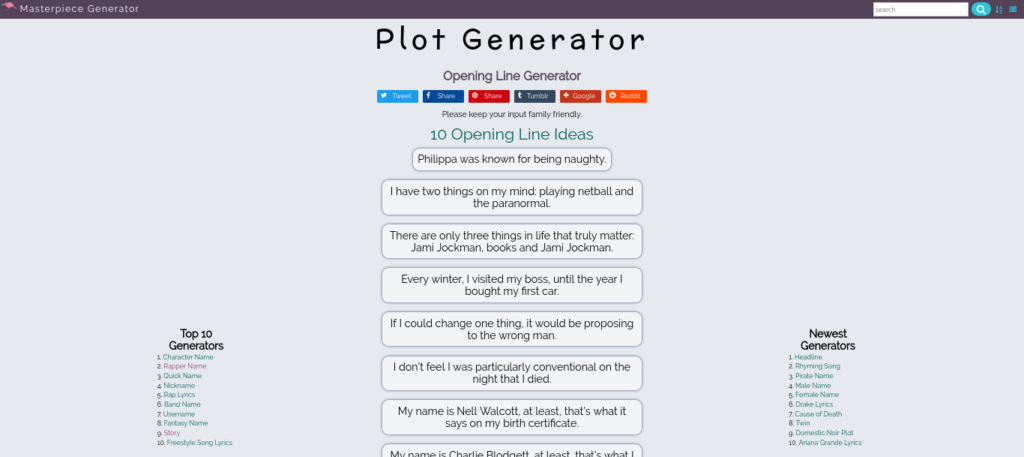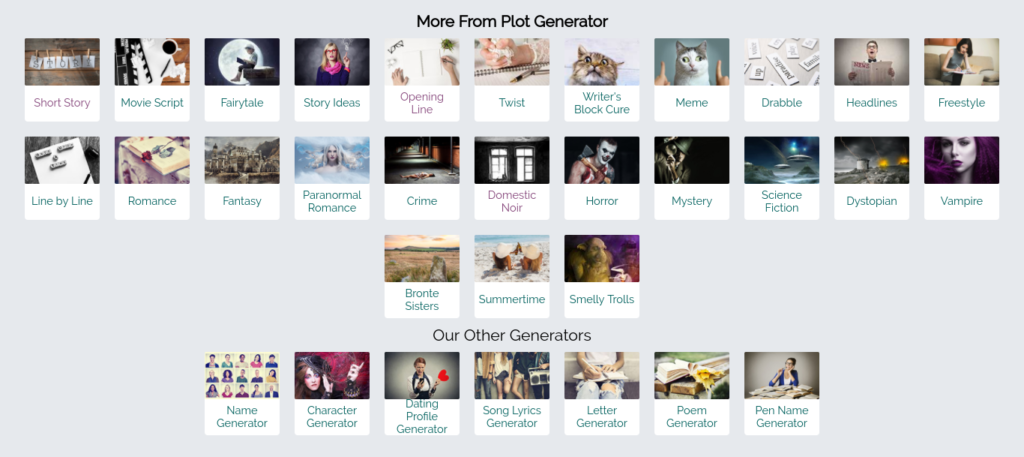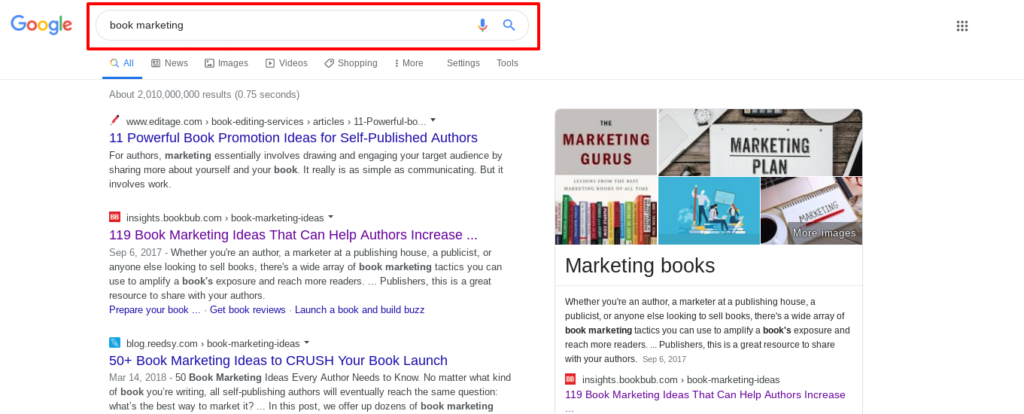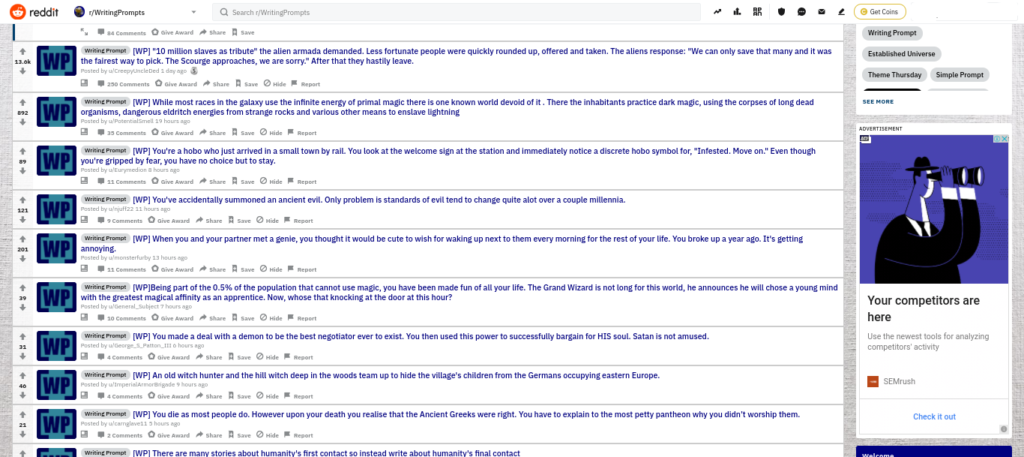You know the feeling. It’s time to sit down and start planning your next bestseller and… nothing.

Well, you’re not alone. Coming up with book ideas can be an absolute nightmare if you’re feeling uninspired, and if you’re looking to produce a bestselling book. Let’s look at four ways to come up with book ideas and get those creative juices flowing again.
1. Use an Online Plot or First Line Generator
Okay, I know what you’re thinking. “First line generators are cheating. They stunt creativity.”
I hear what you’re saying, but stay with me on this one. The fear of the blank page is real. As Stephen King put it: “Let me say it again: you must not come lightly to the blank page.”
No pressure.
When you’re trying to come up with an idea for your next bestseller, you just need a little inspiration. Something to get your brain buzzing. In the movie Finding Forrester, a young writer overcame his writer’s block by copying the intros of his famous mentor’s books and then breaking off into his own story once he found a new direction.
For those of us who don’t have a famous writing mentor, first-line generators can serve a similar purpose. I’ve used these from time to time and they’ve always been a fun way to start the creative process. A personal favorite of mine: Plot-Generator.org.uk gives you a variety of first lines as soon as you enter the site, and you can keep generating more until one of them catches your eye.

My only problem with the generator above is that it’s far too easy to get sidetracked with their other random generators. Although, a few of these can come in handy if you write genre fiction.

If a first line generator isn’t your thing, the team at Reedsy has you covered. Their plot generation tool will give you an entire storyline, filled with protagonists, secondary characters, and plot ideas. All you’ll have to do is write the thing!
What I love in particular about the plot generator is that if you like, say, the main character name but nothing else, you can save that and keep generating new ideas until you get a perfect combination.

There are over a million combinations on the Reedsy generator, so you’ll have ample inspiration.
2. Use Keyword Research to Generate Ideas
I’m sure you’ve used keyword research in your book marketing, but did you know, you can use the same process to come up with ideas for your books?
If you haven’t used keyword research before, you’re in for a treat! Your life is about to get a whole lot easier. Basically, a keyword is an exact phrase that someone types into a search bar online. Usually, in a search engine like the example below.

There are also keywords for other sites, like YouTube, Pinterest and for us authors, Amazon.

The beauty of keywords is, using a few strategies, we can find the exact phrases people use on Amazon when looking to purchase a book. It’s almost like you’re coming up with an idea and validating it at the same time.
To find Amazon keywords that are relevant to you, use the predictive text feature on Amazon’s search bar. Take these steps to get started:
- Turn on the private or Incognito mode on your browser. This is so your search history doesn’t impact results.
- Select ‘Kindle Store’ as the Amazon category.
- Start typing any phrase correlated to your genre and observe the Amazon suggestions. All these autocomplete recommendations are phrases that people have typed into Amazon.

- Write down these phrases as they appear. You can and should go down the rabbit hole here. Don’t be afraid to spend a few hours doing this, as you’ll get plenty of ideas for your next books.
The con with this strategy is that you don’t get any data along with your keywords (plus it’s time consuming). So you don’t know which phrases are popular and which ones have been searched for once or twice. You also don’t know how competitive a particular phrase is. If you want to find that out, you’ve got to do the research yourself and see how many books the top results for a particular keyword sell. If you have a list of potential keywords, this can take days.
However, a tool like Publisher Rocket will give you keywords, search data, and rankings of competitiveness in seconds.
3. Use Online Forums
Online forums are great for finding creative writing prompts to stir your creative juices.
NY Book Editors have a great list of some writers forums you should join, including:
- The Next Big Writer
- Figment
- Critters Writers Workshop
- Hatrack River Writers Workshop
All of these forums are great places to meet other writers and join in the chat. Most good forums will have authors discussing writing, and idea generation is a big part of that. Depending on your genre, you’ll find specialized forums by completing a variation of the following Google search:

Make sure you put the word “forum” in quotation marks because it will filter out any results that don’t include the word on that page.
You can also check out Reddit for a range of forums too. If you aren’t familiar with Reddit, it hosts thousands of forums on every topic imaginable.
r/WritingPrompts is packed with user-generated story starters. A quick look at the feed will bring back the muse.

Here are a few examples:
“’10 million slaves as tribute’ the alien armada demanded. Less fortunate people were quickly rounded up, offered and taken. The aliens’ response: ‘We can only save that many and it was the fairest way to pick. The Scourge approaches, we are sorry.’ After that, they hastily leave.”
“‘The ‘happily ever afters’ never last,’ said the woman who was once known as Cinderella. ‘They may give you a reprieve of a few decades to live your life and raise a family, but the problem when you have fairy godparents is that they really don’t want to stop playing with their favorite toy.’
“You’ve accidentally summoned an ancient evil. The only problem is standards of evil tend to change quite a lot over a couple of millennia.”
The forum is updated all the time and is incredibly active. Some prompts will get thousands of comments and others will fade away. Look through both the popular and unpopular prompts and see what you find.
However… It is important to remember that a forum isn’t a place to rip off another person’s idea. Be cool about it. Just because a great idea is in an online forum, doesn’t necessarily mean that it’s free for the taking.
4. Go Outside (Gasp!)
Next time you’re struggling for a book idea, try getting out of the house and going for a walk. Try the local art gallery or library, or if you live close enough to a national park, go for a hike. As writers, we tend to spend too much time indoors at our computers.
There are oodles of great ideas out there, you just have to find them.
You’ll be surprised at what you’ll find. Whether it’s in a museum or your local coffee shop, pick out items and create the history for them. How did they get to where they are now? People watching will help you come up with new characters, behaviors and backstories too.
You’ll find that even by stepping away from your computer for a few hours, you’ll give your mind some time to recuperate. Your subconscious will go over ideas; and, when you sit back down, you’ll feel refreshed and ready to create.
It will feel odd first. Especially the people watching part. But as they say, “practice makes perfect.”
Soon you’ll start seeing book ideas everywhere you go.
Remember: Keep Your Book Ideas for Later
The best way to avoid running out of book ideas is to write down the ideas you do have. I’m sure we’ve all thought of something and said to ourselves “I’ll remember that later” — and never did. Well, carrying a notebook around can be an absolute game changer for those flashes of brilliance. Even just the act of writing the ideas down will help you remember them.
Collecting your ideas is a great way to build the well before you’re thirsty and make sure you have a range of inspiration to help you in those days when you’re lacking motivation. There are plenty of ways you can record your ideas:
- A notebook or writing pad
- Trello Board
- Evernote
- Pinterest board
- Scrapbook (magazine and newspaper clippings)
- The notes app on your phone
- A Google Doc
Final Thoughts
While the flickering cursor is scary at times, you can find the right idea for your next book if you allow yourself the time to get inspired. Try not to pressure yourself into creating something amazing right away. Take a moment and let the inspiration settle in.
Also, don’t be afraid to do a little writing based on an incomplete idea. Yes, I believe outlining is a smart strategy for writers. But creating an outline requires you to get your idea pretty fleshed out, and a few hours of freestyle writing can help you get the clearer picture you need to identify what other parts your book will need.
Good luck and happy writing.
Cheers!
Photo by James Pond on Unsplash
















